Brief History of Jhandewalan Mandir
Jhandewalan Mandir is a Hindu temple located in the Jhandewalan neighborhood of New Delhi, India. The temple is dedicated to the Hindu goddess Maa Aadi Shakti or Maa Jhandewali. It is one of the oldest and most revered temples in Delhi, with a history that dates back to the early 18th century.
The legend behind the temple’s origin is that a Brahmin priest named Shri Badri Bhagat Ji had a dream in which the goddess appeared to him and asked him to excavate her idol from a particular spot in the Jhandewalan area. When the priest did as he was instructed, he found the idol of Maa Aadi Shakti and built a temple in the same spot. Over time, the temple became a popular place of worship for Hindu devotees.
JHANDEWALAN MANDIR, DELHI
| Locality / Village | Jhandewalan |
| State | Delhi |
| Country | India |
| Nearest City/Town | Karol Bagh |
| Best Season To Visit | All |
| Languages | English & Hindi |
| Temple Timings | 5:00 AM to 12:00 PM and 4:00 PM to 10:00 PM |
| Photography | Not Allowed |
Significance of the Temple to Hindu Devotees
Jhandewalan Mandir holds significant importance to Hindu devotees. It is believed that worshipping Maa Aadi Shakti at the temple can help one overcome various obstacles and fulfill their desires. The temple also holds a special significance during the Navratri festival, which is dedicated to the nine forms of the goddess. During this time, the temple is adorned with lights and decorations, and devotees flock to the temple to seek the blessings of the goddess.
Importance of Exploring the History and Cultural Significance of Jhandewalan Mandir
Exploring the history and cultural significance of Jhandewalan Mandir is important for several reasons. Firstly, it provides insight into the rich cultural heritage of India and the deep-seated religious beliefs of its people. Secondly, it helps to preserve the legacy of the temple and ensure that it continues to be a place of worship for generations to come. Lastly, understanding the cultural significance of Jhandewalan Mandir can help to promote religious tolerance and understanding among people of different faiths.
Jhandewalan Mandir Timings
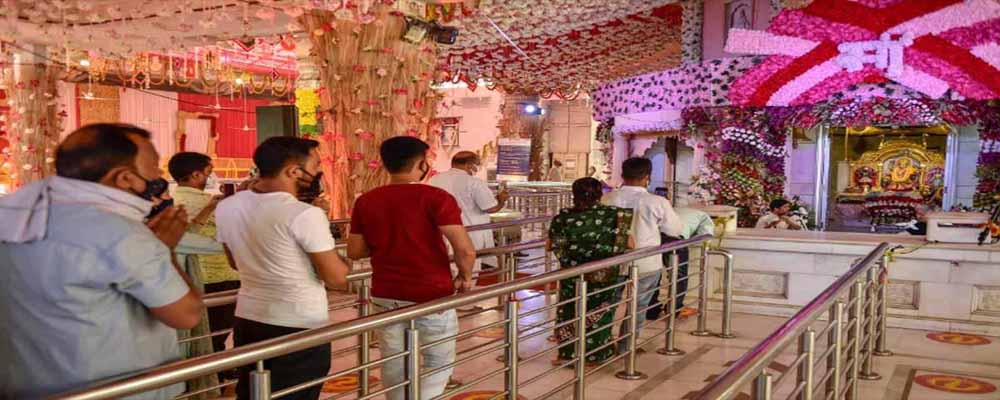
Jhandewalan Mandir is usually open for devotees every day of the week. The temple timings are from early morning until late at night. However, the exact timings may vary depending on the day and the festival or occasion being celebrated.
| Day of the week | Morning Timings | Evening Timings |
|---|---|---|
| Monday | 5:30 AM – 12:00 PM | 4:00 PM – 9:00 PM |
| Tuesday | 5:30 AM – 12:00 PM | 4:00 PM – 9:00 PM |
| Wednesday | 5:30 AM – 12:00 PM | 4:00 PM – 9:00 PM |
| Thursday | 5:30 AM – 12:00 PM | 4:00 PM – 9:00 PM |
| Friday | 5:30 AM – 12:00 PM | 4:00 PM – 9:00 PM |
| Saturday | 5:30 AM – 12:00 PM | 4:00 PM – 9:00 PM |
| Sunday | 5:30 AM – 12:00 PM | 4:00 PM – 9:00 PM |
It’s always best to check the official website or social media pages of the temple or contact the temple authorities for the current timings before visiting.
Jhandewala Mandir Direction
Jhandewalan Mandir is located in the Jhandewalan area of Karol Bagh in New Delhi, India. The temple is situated near the Jhandewalan Metro Station, which is on the Blue Line of the Delhi Metro.
If you are traveling by road, the temple can be reached via the Desh Bandhu Gupta Road or the Arya Samaj Road. The exact address of Jhandewalan Mandir is Jhandewalan Mandir, Jhandewalan, New Delhi, Delhi 110005, India.
It’s always recommended to check the map and plan your route beforehand to avoid any confusion.
The Legend Behind the Temple’s Name
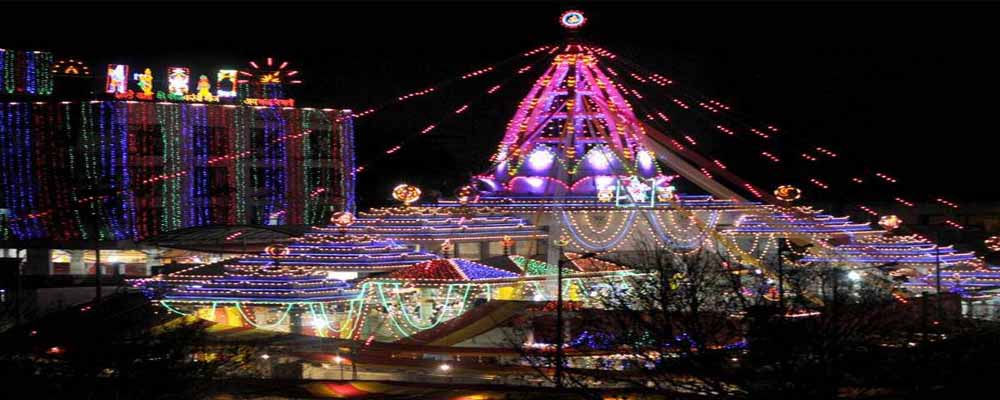
The legend of Jhandewalan Mata
According to the legend, Jhandewalan Mata or Maa Aadi Shakti appeared in the dreams of a pious Brahmin priest named Shri Badri Bhagat Ji. In the dream, the goddess instructed him to excavate her idol from a particular spot in the Jhandewalan area of Delhi. When the priest followed her instructions, he found the idol of the goddess and built a temple in her honor at the same spot.
Origin of the name Jhandewalan Mandir
The temple is named after Jhandewalan Mata because of the presence of a flag (jhandi) that flies atop the temple. The word “Jhandewalan” is derived from the words “jhandi” (flag) and “wala” (place of), which means “the place where the flag flies.”
Role of Jhandewalan Mata in Hindu Mythology
In Hindu mythology, Jhandewalan Mata is believed to be an incarnation of the goddess Durga, who is known as the mother of the universe and the ultimate source of power. She is revered as a symbol of strength, courage, and protection. It is believed that worshipping Jhandewalan Mata can help one overcome obstacles and challenges in life.
The temple of Jhandewalan Mata is an important pilgrimage site for devotees, especially during the Navratri festival when the temple is decorated with lights and devotees offer prayers and seek the blessings of the goddess. The temple is also believed to be a powerful source of energy and positivity that can bring peace and harmony to one’s life.
Jhandewalan Mata holds great significance in Hindu mythology, and the temple named after her is an important cultural and religious landmark in Delhi that attracts millions of devotees every year.
The Architecture and Design of the Temple
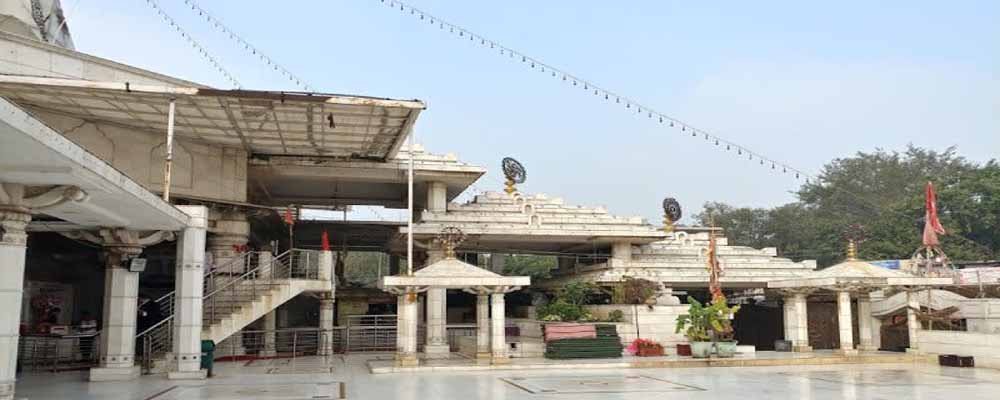
Jhandewala Mata Temple’s Architectural Style
Jhandewalan Mandir is an ancient Hindu temple located in the Jhandewalan neighborhood of Delhi. The temple’s architectural style is a blend of North Indian and South Indian temple architecture. The temple’s design and construction reflect the traditional Indian temple architecture, which follows a set of principles and rules.
The temple’s main entrance features a magnificent archway that leads to a spacious courtyard. The courtyard is surrounded by a number of smaller shrines dedicated to various deities, as well as a large hall where devotees can sit and offer their prayers. The central shrine of the temple is dedicated to Jhandewalan Mata, which is adorned with intricate carvings and decorations.
Elements of the Temple’s Design
One of the most striking elements of the temple’s design is the use of vibrant colors and intricate patterns. The temple’s walls are adorned with colorful paintings and murals that depict various scenes from Hindu mythology. The temple’s roof is also adorned with decorative elements, including domes, spires, and intricate carvings.
Significance of the Temple’s Layout and Structure
The layout and structure of the temple are significant in several ways. Firstly, the temple’s design is based on the principles of Vastu Shastra, which is an ancient Indian architectural science that emphasizes the importance of balance and harmony in design. This is reflected in the temple’s symmetry and balance of proportions.
Secondly, the temple’s design and layout are intended to create a sense of unity and harmony among its visitors. The spacious courtyard and the smaller shrines surrounding the main shrine create a sense of community and belonging among the devotees.
Finally, the temple’s structure is designed to create a sense of reverence and awe among its visitors. The grand entrance, the intricate carvings, and the beautiful paintings all serve to create a sense of the divine and inspire devotion and respect.
The design and layout of Jhandewalan Mandir are a testament to the rich cultural heritage of India and the deep-seated religious beliefs of its people. The temple’s architecture is a testament to the skill and creativity of the ancient Indian craftsmen and reflects the enduring legacy of Indian temple architecture.
The Religious Significance of the Jhandewalan Temple
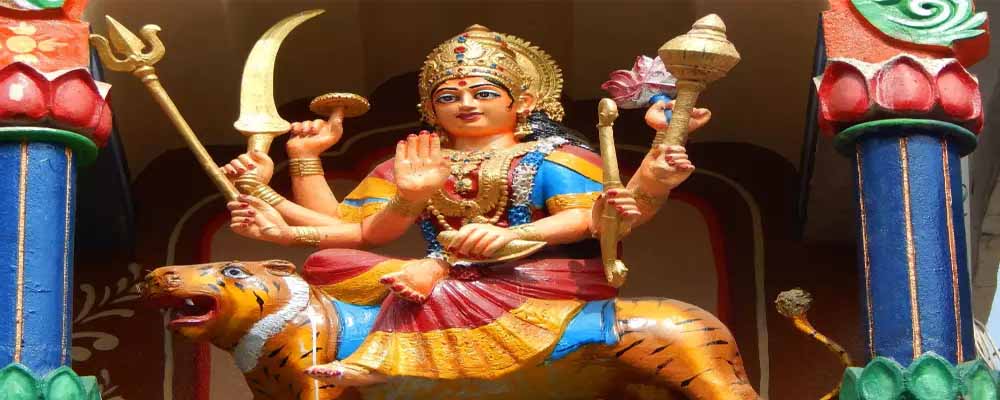
Importance of Jhandewalan Mandir in Hinduism
Jhandewalan Mandir is a significant place of worship for Hindus in Delhi and beyond. The temple is dedicated to Jhandewalan Mata, an incarnation of the goddess Durga and is revered as a source of strength, courage, and protection. The temple attracts millions of devotees every year who come to seek the blessings of the goddess and offer their prayers.
Rituals and Practices Observed in the Temple
Various rituals and practices are observed in the temple to honor Jhandewalan Mata. These include the lighting of lamps, the offering of flowers and fruits, and the chanting of hymns and mantras. Devotees also perform aarti, a ritual where they offer prayers to the goddess with lighted lamps, incense, and flowers.
Role of the Temple in Hindu Festivals and Celebrations
The temple plays a significant role in various Hindu festivals and celebrations. During Navratri, which is a nine-day festival dedicated to the worship of the goddess Durga, the temple is decorated with lights, and special prayers and offerings are made to the goddess. On the last day of Navratri, which is known as Vijayadashami or Dussehra, a special ceremony is held where an effigy of the demon king Ravana is burned to symbolize the victory of good over evil.
The temple also plays an important role in the celebration of Diwali, which is a five-day festival of lights. During Diwali, the temple is illuminated with lights, and special prayers are offered to the goddess for prosperity and good fortune. Devotees also perform puja, a ritual where they offer prayers and offerings to the goddess for blessings and protection.
Jhandewalan Mandir holds immense significance in Hinduism and is a symbol of the deep-seated religious beliefs and traditions of the Indian people. The temple serves as a source of strength and inspiration for millions of devotees who come to seek the blessings of the goddess and find peace and solace in her divine presence.
The History of Jhandewalan Mandir
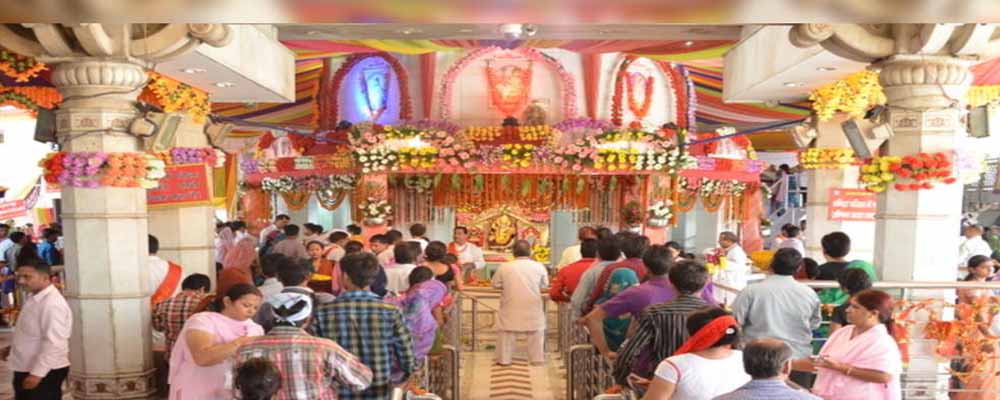
Early History of the Temple
The early history of Jhandewalan Mandir is shrouded in myth and legend. According to popular belief, the temple was originally built during the reign of the Pandavas, the heroes of the Indian epic, the Mahabharata. The temple is believed to have been built at the spot where Arjuna, one of the Pandavas, had offered his prayers to the goddess Durga before going into battle.
Over time, the temple underwent several renovations and expansions. The temple’s current structure is believed to have been built during the reign of the Mughal emperor, Akbar. The temple also played a significant role in the Indian War of Independence in 1857, when it served as a meeting place for the rebels who were fighting against British rule.
Historical Events and Figures Associated with the Temple
Several historical events and figures are associated with Jhandewalan Mandir. During the 1857 War of Independence, the temple served as a gathering place for the rebels who were fighting against British rule. The temple also played a significant role in the Indian independence movement and was visited by several prominent freedom fighters, including Mahatma Gandhi and Jawaharlal Nehru.
Role of Jhandewalan Mandir in Delhi’s Cultural Heritage
Today, Jhandewalan Mandir is an important part of Delhi’s cultural heritage. The temple’s architecture and design reflect the rich cultural and artistic traditions of India. The temple also serves as a hub of cultural and religious activities and attracts devotees and visitors from all over the world.
Jhandewalan Mandir has a rich and storied history that is intertwined with the cultural and religious traditions of India. The temple’s enduring legacy as a place of worship and spiritual solace has made it a cherished symbol of Delhi’s cultural heritage and a testament to the enduring faith and devotion of the Indian people.
The Temple’s Relevance Today
Contemporary Role of Jhandewalan Mandir in Hinduism
Jhandewalan Mandir continues to play an important role in contemporary Hinduism. The temple serves as a source of strength, inspiration, and guidance for millions of devotees who come to seek the blessings of the goddess and offer their prayers. The temple’s significance to Hindu devotees is evident in the large crowds that throng the temple on auspicious occasions and festivals.
The Temple’s Continued Significance to Devotees
The temple’s continued significance to devotees can be attributed to its deep-seated religious and cultural roots. The temple is believed to be a powerful source of protection and good fortune, and its rituals and practices are steeped in tradition and mythology. The temple’s architecture and design reflect the rich artistic and cultural traditions of India, and its enduring legacy has made it an important symbol of Delhi’s cultural heritage.
The Enduring Legacy of Jhandewalan Mandir in Delhi
Jhandewalan Mandir’s enduring legacy in Delhi is evident in the numerous cultural and religious activities that take place within its walls. The temple serves as a hub for a range of cultural and religious events, including bhajans, kirtans, and religious discourses. The temple also plays a significant role in the celebration of Hindu festivals and serves as a gathering place for devotees and visitors from all over the world.
Jhandewalan Mandir continues to hold immense significance in contemporary Hinduism and serves as a powerful symbol of faith, devotion, and cultural heritage. The temple’s enduring legacy is a testament to the deep-seated religious and cultural traditions of India and a reminder of the enduring power of faith and spirituality.
The Cultural Significance of Jhandewalan Mandir
Jhandewalan Mandir as a Symbol of Delhi’s Cultural Identity
Jhandewalan Mandir is a powerful symbol of Delhi’s cultural identity. The temple’s rich history, architectural splendor, and cultural significance have made it an integral part of the city’s cultural heritage. The temple’s enduring legacy has also had a significant influence on Delhi’s art and architecture, shaping the city’s aesthetic identity and cultural landscape.
Influence of the Temple on Delhi’s Art and Architecture
The temple’s influence on Delhi’s art and architecture can be seen in the numerous architectural styles and artistic traditions that have been incorporated into the city’s buildings and monuments. The temple’s iconic red and white facade, intricate carvings, and ornate design elements have inspired countless artists and architects and can be seen in buildings and monuments throughout the city.
Role of the Temple in the Preservation of Delhi’s Cultural Heritage
Jhandewalan Mandir also plays an important role in the preservation of Delhi’s cultural heritage. The temple serves as a repository of cultural and artistic traditions, and its rituals and practices reflect the deep-seated religious and cultural traditions of India. The temple’s importance as a cultural and religious center has also helped to preserve and promote Delhi’s rich artistic and cultural heritage.
Jhandewalan Mandir is a powerful symbol of Delhi’s cultural identity and an important part of the city’s cultural heritage. The temple’s enduring legacy has had a significant influence on Delhi’s art and architecture, and its role in the preservation of Delhi’s cultural heritage is a testament to its enduring importance as a cultural and religious center.
The Community of Jhandewalan Mandir
The Temple’s Community of Devotees and Followers
Jhandewalan Mandir is not just a place of worship, but also a vibrant community of devotees and followers. The temple serves as a hub for a range of social and cultural activities, providing opportunities for devotees to come together and celebrate their faith and cultural heritage.
Social and Cultural Activities Associated with the Temple
The temple hosts a range of social and cultural activities, including bhajans, kirtans, religious discourses, and other events that celebrate the rich cultural traditions of India. These events provide a platform for devotees to come together and share their faith and cultural identity, creating a sense of community and belonging.
Ways to Get Involved in the Community of Jhandewala Mandir
There are many ways to get involved in the community of Jhandewalan Mandir. One can participate in the various social and cultural activities organized by the temple, volunteer for various temple services, or simply attend regular prayers and ceremonies at the temple. By getting involved in the temple community, devotees can deepen their understanding of their faith and cultural heritage, while also building meaningful relationships with other members of the community.
Jhandewalan Mandir is a vibrant community of devotees and followers that provides opportunities for social and cultural engagement. Through its range of social and cultural activities, the temple serves as a platform for devotees to come together and celebrate their faith and cultural heritage. By getting involved in the temple community, devotees can deepen their understanding of their faith and cultural identity, while also building meaningful relationships with other members of the community.
The Impact of Jhandewalan Mandir on Society
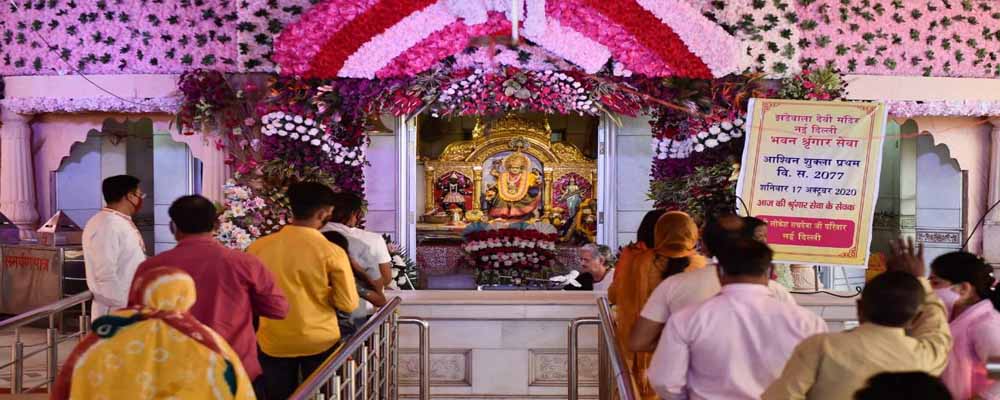
The Temple’s Role in Promoting Social Cohesion
Jhandewalan Mandir plays an important role in promoting social cohesion and community development. The temple’s emphasis on communal worship and cultural celebration helps to create a sense of shared identity and belonging among its followers, fostering social cohesion and unity.
Influence of Jhandewalan Mandir on Community Development
The temple also plays an active role in community development, organizing a range of social welfare and community service activities. These activities include health camps, blood donation drives, and educational programs, among others. By providing these services to the community, the temple helps to improve the well-being of its followers, while also promoting a sense of social responsibility and community engagement.
In addition to its community service activities, Jhandewalan Mandir also engages in various charitable initiatives. The temple runs a number of charitable trusts and organizations that focus on providing assistance to the needy and disadvantaged. These initiatives include programs that provide food, shelter, and medical care to those in need, as well as programs that support education and skills development.
Impact of the Temple’s Charitable Activities on Society
The impact of the temple’s charitable activities on society has been significant, providing critical support to some of the most vulnerable and marginalized communities in the city. The temple’s focus on community service and social welfare has helped to promote greater social equality and inclusion, while also fostering a sense of shared responsibility and community engagement.
Jhandewalan Mandir’s emphasis on communal worship, cultural celebration, and community engagement helps to promote social cohesion and community development. The temple’s active involvement in social welfare and community service initiatives, as well as its focus on charitable activities, have had a significant impact on society, improving the well-being of its followers and providing critical support to those in need.
Famous Visitors to Jhandewalan Mandir
Notable Personalities who have Visited the Temple
Jhandewalan Mandir has been visited by many notable personalities over the years. Some of the famous visitors include former Indian Prime Minister Indira Gandhi, former President of India Pranab Mukherjee, former Delhi Chief Minister Sheila Dixit, and current Delhi Chief Minister Arvind Kejriwal. Other notable visitors include Bollywood actors and actresses, spiritual leaders, and politicians from various parties. The temple’s significance and cultural importance attract visitors from all walks of life.
Role of the Temple in Delhi’s Tourism Industry
The temple also plays an important role in Delhi’s tourism industry. As one of the city’s most important cultural landmarks, Jhandewalan Mandir attracts thousands of visitors from around the world each year. These visitors are drawn to the temple’s unique blend of historical and cultural significance, as well as its reputation as a center for spiritual and community engagement.
The Temple’s Significance to Visitors from Around the World
The temple’s significance to visitors from around the world is multifaceted. For many, Jhandewalan Mandir represents a spiritual destination, a place to connect with the divine and deepen one’s understanding of Hinduism. For others, the temple represents a window into India’s rich cultural heritage, offering insights into the country’s history, art, and architecture. Still, others come to the temple to participate in the various social and cultural activities organized by the temple, connecting with fellow devotees and building meaningful relationships with members of the local community.
Jhandewalan Mandir has been visited by many notable personalities over the years, and plays an important role in Delhi’s tourism industry. The temple’s significance to visitors from around the world is multifaceted, reflecting its unique blend of historical, cultural, and spiritual significance. Whether as a destination for spiritual seekers, a hub for cultural exploration, or a center for community engagement, Jhandewalan Mandir continues to draw visitors from around the world, enriching the lives of its followers and visitors alike.
Jhandewalan Mandir and Women Empowerment
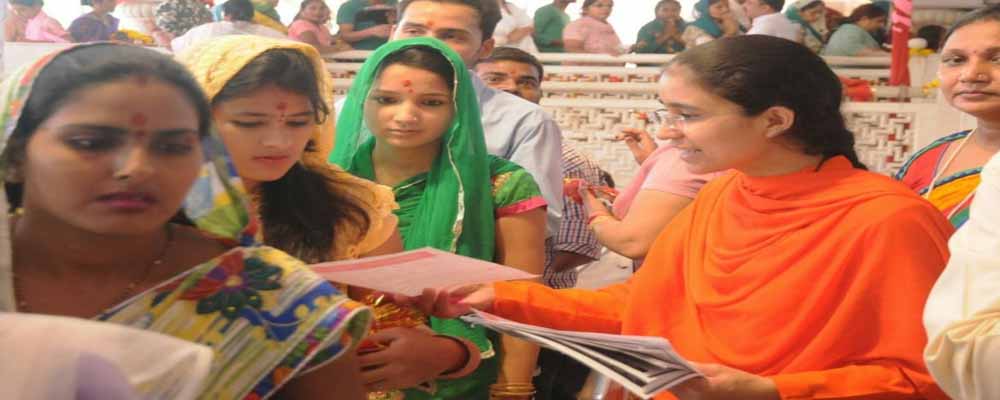
Initiatives Undertaken by the Temple to Empower Women
Jhandewalan Mandir has undertaken several initiatives to empower women and promote gender equality. These initiatives include educational programs, vocational training, and microfinance initiatives aimed at providing women with the skills and resources they need to build successful and independent lives.
Role of Jhandewalan Mata in Promoting Women’s Rights
Jhandewalan Mata, the presiding deity of the temple, is a powerful symbol of women’s empowerment and plays an important role in promoting women’s rights. As a fierce and compassionate goddess, Jhandewalan Mata represents the strength, resilience, and determination of women everywhere, inspiring women to take control of their lives and pursue their dreams.
Stories of Women who have been Positively Impacted by the Temple’s Activities
There are many stories of women who have been positively impacted by the temple’s activities. For example, the temple’s vocational training programs have helped women develop skills in a variety of areas, including tailoring, embroidery, and handicrafts. These skills have enabled women to start their own businesses and become financially independent, improving their lives and the lives of their families.
The temple has also been involved in several initiatives aimed at promoting education for girls and women. By providing scholarships and educational resources to girls and young women, the temple has helped to break down barriers to education and empower women to pursue their dreams.
In addition to these initiatives, the temple has also been involved in several campaigns aimed at raising awareness about women’s rights and promoting gender equality. Through workshops, seminars, and other activities, the temple has helped to foster a culture of respect, understanding, and inclusion, promoting the empowerment and well-being of women throughout Delhi and beyond.
Jhandewalan Mandir has undertaken several initiatives to empower women and promote gender equality, inspired by the powerful example of Jhandewalan Mata. Through its programs and activities, the temple has helped women develop skills, gain access to education and resources, and become agents of change in their communities. As a symbol of women’s empowerment and a force for positive change, Jhandewalan Mandir continues to inspire and uplift women throughout Delhi and beyond.
The Future of Jhandewalan Mandir
Plans for the Temple’s Future Development
Jhandewalan Mandir has a bright future ahead, with several plans for its development and expansion in the works. One of the key initiatives is the construction of a new community center, which will provide space for social and cultural activities, educational programs, and vocational training initiatives. The temple is also exploring the possibility of developing a new park and recreational area, which would provide a space for visitors and members of the community to relax and unwind.
Challenges Facing the Temple and its Community
However, there are also several challenges facing the temple and its community. One of the most pressing challenges is the ongoing COVID-19 pandemic, which has disrupted daily life and impacted the temple’s ability to carry out its activities and initiatives. Additionally, the temple faces challenges related to infrastructure and development, as it seeks to expand and provide more services to its community.
Ways to Support the Continued Growth and Success of Jhandewalan Mandir
To support the continued growth and success of Jhandewalan Mandir, there are several ways to get involved. One option is to volunteer with the temple, helping out with activities and initiatives, and contributing to the temple’s ongoing success. Another option is to make a donation to support the temple’s work, helping to fund key initiatives and programs that benefit the community. Finally, visitors to Delhi can support the temple by including it in their itinerary, learning about its rich history and cultural significance, and spreading the word about its important work in promoting social and cultural development in Delhi.
How to Reach Jhandewalan Mandir
Jhandewalan Mandir is located in the Jhandewalan area of Karol Bagh in New Delhi, India. There are several ways to reach the temple, including:
- By Metro: Jhandewalan Metro Station is the closest metro station to the temple, which is on the Blue Line of the Delhi Metro.
- By Bus: There are several local buses that stop near Jhandewalan Mandir. You can check with the local bus operator or the Delhi Transport Corporation (DTC) for the routes and timings.
- By Auto-rickshaw or Taxi: Auto-rickshaws and taxis are readily available in Delhi, and you can hire one to reach the temple.
- By personal vehicle: If you are driving your own vehicle, you can reach Jhandewalan Mandir via the Desh Bandhu Gupta Road or the Arya Samaj Road.
It’s always recommended to plan your route beforehand and check the traffic conditions to avoid any delays.
Conclusion
In summary, Jhandewalan Mandir is a significant temple in Delhi with a rich history and cultural significance. The temple is dedicated to Jhandewalan Mata, a revered Hindu goddess, and attracts thousands of devotees and visitors each year. The temple’s architectural style, design elements, and layout all hold symbolic meaning, and the temple plays a significant role in promoting social cohesion and community development.
The temple has faced several challenges over the years, including disruptions caused by the COVID-19 pandemic and infrastructure-related issues. However, plans for the temple’s future development, including the construction of a new community center and recreational area, offer hope for continued growth and success.
Jhandewalan Mandir’s enduring legacy can be seen in its influence on Delhi’s art and architecture, as well as its role in promoting women’s empowerment and charitable initiatives. Visitors to Delhi can support the temple by including it in their itinerary, learning about its rich history and cultural significance, and supporting its ongoing work to promote social and cultural development in the city. Overall, Jhandewalan Mandir is a testament to the enduring power and significance of Hindu culture and tradition, and its continued importance to the people of Delhi and beyond.
FAQs
Short Answer Why is Jhandewalan Mandir so famous?
Jhandewalan Mandir is famous because it is a revered Hindu temple in Delhi, dedicated to Jhandewalan Mata, and has a rich history, cultural significance, and architectural style.
Is jhandewalan a Shakti Peeth?
No, Jhandewalan Mandir is not a Shakti Peeth.
What is the time of Jhandewalan Aarti?
The timing of Jhandewalan Aarti may vary, but it usually takes place early in the morning at around 5:30 am and in the evening at around 6:30 pm. However, it’s best to confirm the timing of Aarti with the temple authorities or check their official website or social media pages.
What is the name of Jhandewalan Mandir?
The name of the temple is Jhandewalan Mandir. It is a Hindu temple located in the Jhandewalan area of Karol Bagh, New Delhi, India. The temple is dedicated to Jhandewalan Mata, a form of the Hindu goddess Durga.

